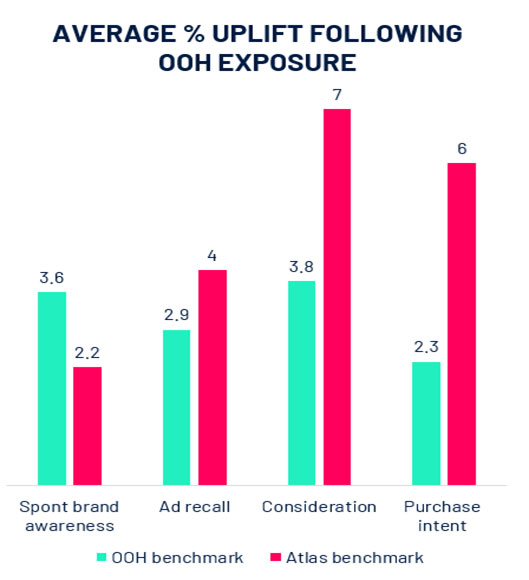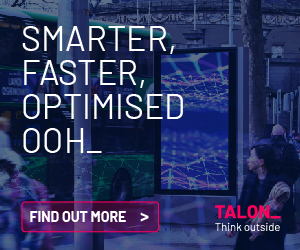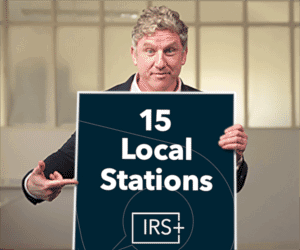To ignore the potential of OOH in driving action or inspiring a purchase, would be a missed opportunity, writes Aoife Hudson.
Traditionally, Out of Home (OOH) has been viewed as a top-of-the-funnel media channel due to its ability to drive broadcast awareness.
With the unveiling of new technology, we are beginning to see OOH fulfilling a much greater role, driving bottom-funnel metrics and direct action amongst consumers. Metrics which until recently, have been associated with online, performance channels.
It begs the question, is OOH better at generating brand awareness than driving action?
The short answer is it can do both!
OOH is not one medium, it is a blend of multiple formats across multiple environments, that gives the channel the ability to dominate the public space and reach consumers in numerous mindsets. OOH continues to deliver in its role according to a 2022, Talon benchmark study, which comprised 40 Irish campaigns and interviewed over 10,000 respondents. The results showed a marked increase across all measures, in particular for message delivery and call to action (+6%), thus demonstrating the effectiveness of the medium.
However, today’s world is a digital world, and the role of OOH is evolving. Digital now holds 43% of the overall OOH wallet, with the proportion of OOH revenue derived from DOOH continuing to increase year on year. This growth is fuelled by a rapid expansion of DOOH inventory (+8% in the last 18 months), with a focus on large format roadside DOOH. What is most evident is how these technologies are driving Out of Home down the purchasing funnel, demonstrating effectiveness in driving consideration and purchase intent.
PROOH
Programmatic although in its infancy in Ireland, has seen significant growth over the last few years globally, with advertisers recognizing benefits such as greater flexibility and agility in their campaigns. In a recent research study conducted by our colleagues in the UK, data showed that the use of Atlas (intelligent, audience-first DOOH buying platform) is delivering an x2 increase in purchase consideration and an x3 increase in purchase intent versus a traditional Out of Home buy.
From an Irish perspective, we have seen similar trends where programmatic DOOH has overachieved in shifting KPIs relating to driving action; more than KPIs relating to spontaneous awareness. One campaign that activated around key consumption times for the brand drove consideration by 44%.
At Talon, we are seeing increased appetite from clients to trial programmatic OOH and understand where it fits as part of their overall media mix.
What does this mean for you: The use of programmatic DOOH alongside awareness-building strategies can be powerful in driving metrics along the entire brand funnel, increasing OOH’s capability as a prime channel in the overall media mix.
DYNAMIC CONTENT MANAGEMENT
Dynamic campaigns allow us to increase effectiveness and drive intent by focusing on context. At Talon, understanding audiences and their behaviour whilst OOH is paramount. We understand the key moments when our audiences are most likely to be influenced by a brand’s communications. Dynamic technology allows us to activate at these key moments. When we look at the performance of dynamic campaigns versus any OOH campaign, we are seeing a +63% uplift in consideration, and a +50% uplift in purchase behaviour – proving the power of OOH in driving bottom-funnel metrics.
What does this mean for you: If our objective is driving sales, we should be taking an audience-first approach to strategy and curating content to activate at key consumption moments for our target group.
SHOPPABLE OOH
OOH can now offer instant solutions to make our campaigns shoppable.
Since 2020, QR codes have seen a massive resurgence across many industries, not least OOH.
In a recent study by Talon in Ireland, we looked at Irish consumers’ appetite to interact and take action after exposure to an OOH message. 57% of respondents agreed that they would be likely to scan a QR code on an OOH ad to find out more.
What does this mean for you: QR codes on Out of Home are effective for driving immediate engagement and boosting real-time conversion, and the inclusion of dwell time formats encourages passers-by to invoke an action.
To ignore the potential of the Out of Home medium in driving action or inspiring a purchase, would be a missed opportunity – it’s evident that the features & capabilities support every stage of the purchasing funnel. It’s time for planners to get creative by combining multiple formats to ensure their message is being received by the right audience and reaching them at all stages of their journey.
Aoife Hudson is deputy managing director of Talon in Ireland.
Notes: Methodology: Talon Benchmarks, Talon has created benchmarks to help identify the best formats for driving specific key performance metrics, allowing clients to see how their campaign has performed versus the average.
Methodology: QR code research was conducted by Spark Market Research, on a main urban sample of 250 respondents 16+ using an online methodology.























